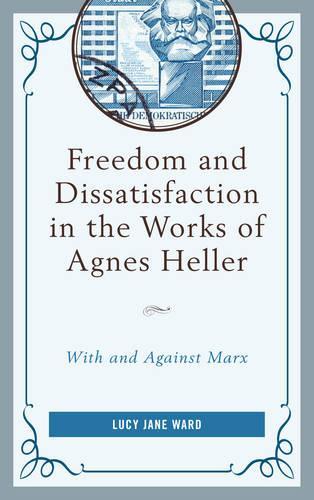
Freedom and Dissatisfaction in the Works of Agnes Heller: With and against Marx
(Hardback)
Publishing Details
Freedom and Dissatisfaction in the Works of Agnes Heller: With and against Marx
By (Author) Lucy Jane Ward
Bloomsbury Publishing PLC
Lexington Books
27th December 2016
United States
Classifications
Professional and Scholarly
Non Fiction
Social and political philosophy
Ethics and moral philosophy
Philosophy of language
194.439
Physical Properties
Hardback
274
Width 159mm, Height 238mm, Spine 25mm
594g
Description
Wards book focuses on the work of the Hungarian philosopher Agnes Heller; prominent member of the Budapest School, a group of students who studied under the Marxist social theorist Gyrgy Lukcs. For both Marx and Heller (albeit in different ways) dissatisfaction emerges as the inevitable result of the expansion of need(s) within modernity and as a catalyst for the development of anthropological wealth (what Marx refers to as the 'human being rich in need'). Ward argues that dissatisfaction and the corresponding category of human wealthas both motif and methodis central to grasping Hellers seemingly disparate writings. While Marx postulates a radical overcoming of dissatisfaction, Heller argues dissatisfaction is integral not only to the on-going survival of modernity but also to the dynamics of both freedom and individual life. In this way Hellers work remains committed to a position that both continually returns and departs, is both with and against, the philosophy of Marx. This book will be of interest to scholars of political philosophy, social theory, critical theory, and sociology.
Reviews
This is an important book. Scholars of Agnes Hellers work will find it exceptionally illuminating. Theorists who would utilize the succession of critical theory that runs from Marx through Lukcs and the Budapest School will find in it a treatment of Hellers distinctive critical theory previously unavailable in any literature. More urgently, this study is so important because as Ward identifies Hellers array of interpretative tools, she also employs them in an argument which ends up placing Hellers Marx on the developmental spectrum of modern liberalism . . . Ward is an adept guide into Hellers thinking and forceful interlocutor for those who are already taken up with it. Her book is mandatory reading for anyone interested in Heller and in alternatives to the Frankfurt line of critical theory. It will prove valuable also for those concerned with how, as Marx intended, the ideological trappings of freedom might cease to stand against the free development of individual personalities and collaborative alliances. * Thesis Eleven *
Author Bio
Lucy Jane Ward teaches in the School of Social and Political Sciences at the University of Melbourne.
